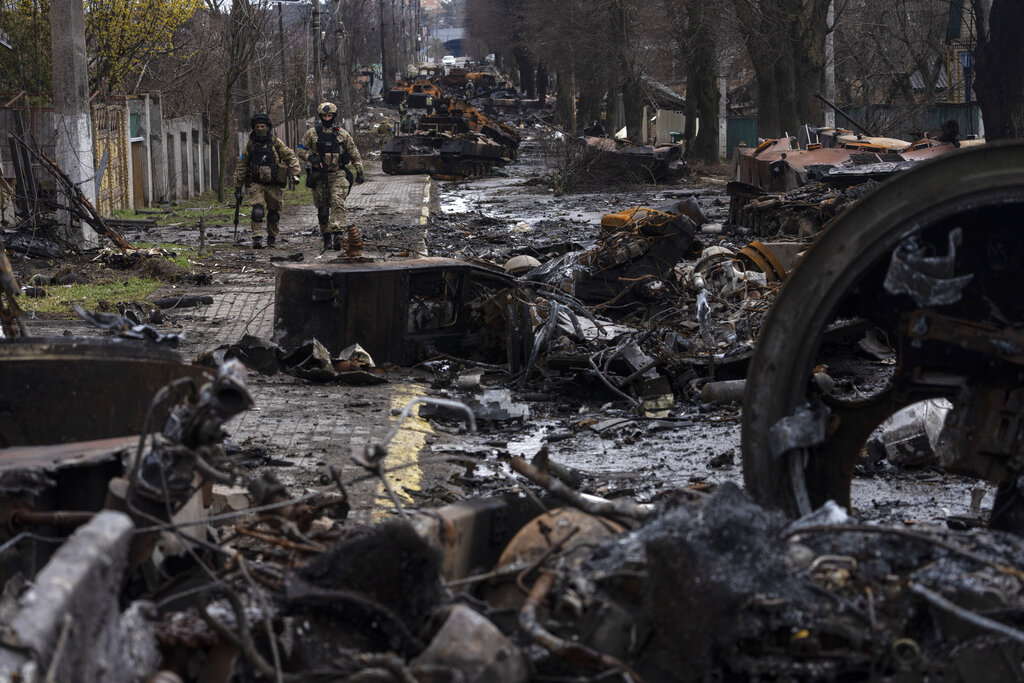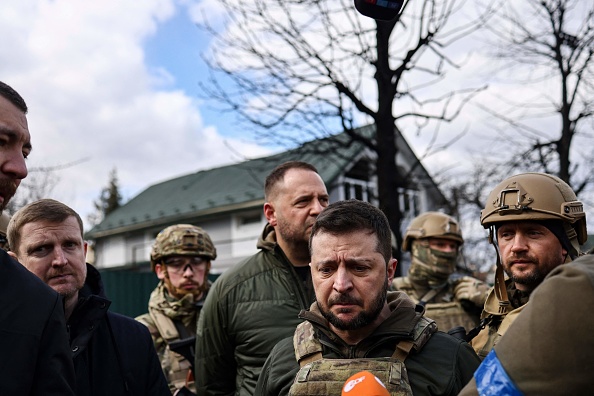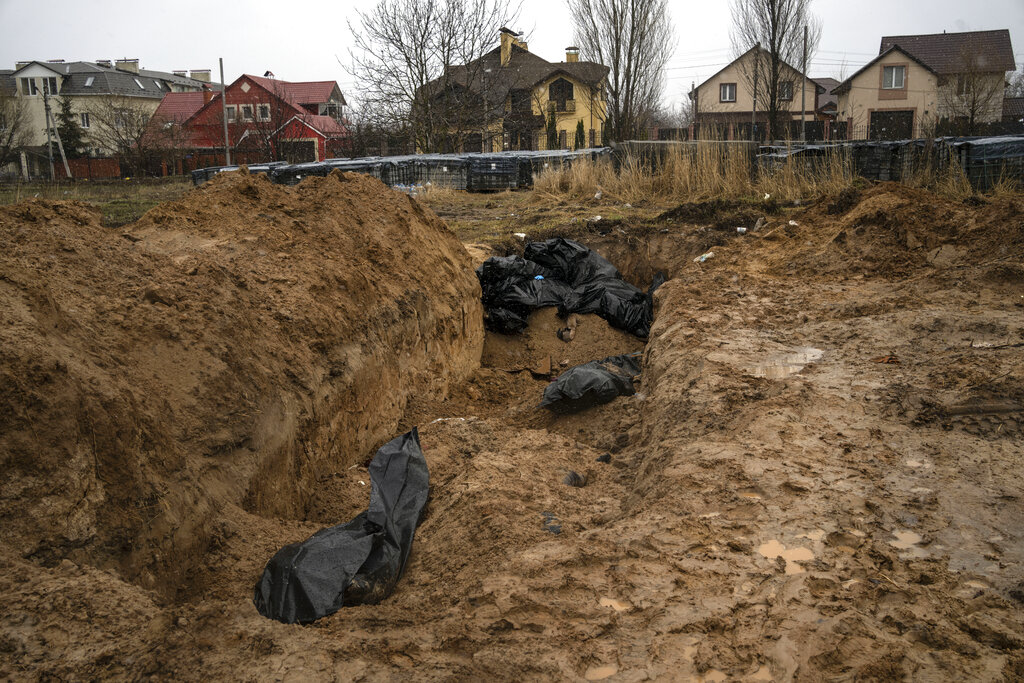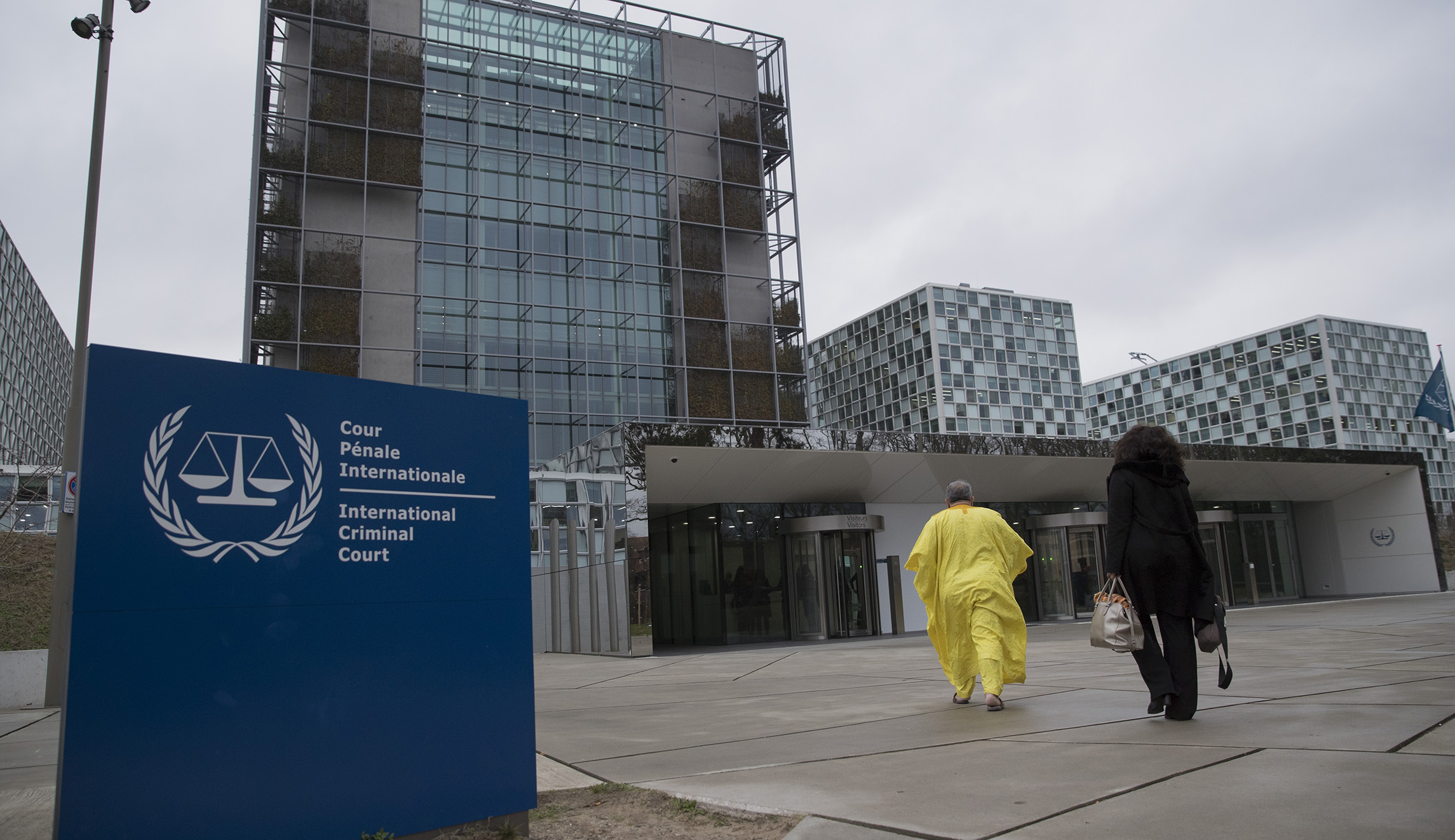
Their mangled body parts were discarded like yesterday’s trash.
Entire Ukrainian families, unarmed and helpless, were blown to bits after allegedly being fired upon by Russian forces.
One man was found face down with his hands tied behind his back. Another was located on the side of the road with a single bullet to the back of his head. His green bicycle, bent and battered, lay next to him. Some civilians had been stuffed into sewers, while others were shoved into shallow graves.
Then, Bucha, a suburb northwest of Kyiv, was burned.
The destruction was so severe that it drove Ukrainian President Volodymyr Zelensky to tears when he visited on Monday, triggered global outrage, and renewed calls for Russia to be prosecuted for war crimes.
The leaders of Poland, France, Spain, Japan, Latvia, and Germany were among those who spoke out in various degrees of the atrocities in Bucha. The European Commission announced it was sending investigators to Ukraine to help document war crimes, a move Britain endorsed.
President Joe Biden called Russian President Vladimir Putin a “war criminal” and said it is essential for the international community to “gather all the details” to ensure Putin faces a war crimes trial.
ZELENSKY OVERCOME WITH EMOTION AS HE VISITS HORROR AT BUCHA
“This guy is brutal, and what’s happening in Bucha is outrageous,” Biden said Monday. “I think it’s a war crime.”
But despite mounting evidence, justice is unlikely to be swift, and Bucha isn’t an isolated incident.

Olga Sukhenko, the mayor of Motyzhyn, a village on the outskirts of Kyiv, was recently kidnapped, tortured, and executed. Her body was dumped into a freshly dug grave alongside her husband and son, said Anton Herashchenko, an adviser to the Ukrainian Interior Ministry.
Last week, a woman using the pseudonym Natalya told the Times of London about being repeatedly gang-raped by drunk Russian soldiers after they shot her husband dead in their front yard in Shevchenkove, another village near the capital city. When she started crying, one soldier allegedly told her, “You’d better shut up or I’ll get your child and show him his mother’s brains spread around the house.”
Natalya’s 4-year-old son was in the boiler room next to where they raped her. When he started making noise, the soldiers pointed a gun to her head and “told me to go shut him up and come back,” she said. Her rape continued for hours.
The horrific tales coming out of Ukraine in the seven weeks since Putin ordered his troops to invade the country have prompted calls for the International Criminal Court to go after those accused of war crimes. And even though the top war crimes prosecutor for the ICC has been dispatched to investigate claims, the process is a lengthy one that largely shuts out the United States. Obtaining prosecutions for war crimes could take years at best, if it happens at all.

“It’s not realistic to think anything will happen any time soon,” said Marquette University professor Mark Berlin, who teaches international law.
Located in The Hague, Netherlands, the ICC was created by a treaty called the Rome Statute and operates independently. The treaty was signed by 123 countries. Those not on the list include the U.S., Russia, and Ukraine. Despite not signing it, Ukraine allowed the group jurisdiction in 2013.
While the ICC’s investigation into alleged Russian war crimes could yield indictments within the next few months, the process of carrying those indictments out could drag on for years. The ICC, for example, just recently announced it was seeking arrest warrants related to Russia’s 2008 war against Georgia.
The ICC, which has specific definitions prosecutors must meet for genocide, war crimes, and crimes against humanity, tries people, not countries, and focuses on the bad behavior of leaders and officials.
A key complication is that all ICC trials must be held in person, meaning an official accused must either be captured or turn themselves over, which is unlikely should Putin or his military commanders be charged. However, if a person crosses over to an ICC nation, then that nation would be legally obligated to make an arrest.

The news is worse for victims of rape and sexual assault. Though both, when committed during conflict, are legally considered atrocity crimes, getting justice hardly ever occurs.
“Rape is the most common form of torture that is rarely, rarely prosecuted,” Tanya Domi, an adjunct professor at Columbia University and affiliate faculty member of the Harriman Institute, told the Washington Examiner.
For example, an estimated 20,000 rapes against Kosovar women were allegedly carried out by Serbian soldiers and police during the Kosovo War between 1998 and1999, but only one has been prosecuted and is currently on appeal, she said.
The ICC made its first conviction for sexual crimes in 2016 against Jean-Pierre Bemba Gombo, the former vice president of the Democratic Republic of the Congo. He was found guilty for atrocities committed in the Central African Republic between 2002 and 2003, but two years later, an appeals court acquitted him on all charges.
In 2019, Congolese rebel commander Bosco Ntaganda was convicted for crimes including sexual slavery and rape committed in the Democratic Republic of the Congo in 2003. An appeals court upheld the original court’s ruling, making it a landmark conviction for wartime rape.
Domi, a former congressional defense policy analyst who served in the U.S. Army for 15 years, has been busy behind the scenes pushing for prosecutions in regional courts and at the local level.
CLICK HERE TO READ MORE FROM THE WASHINGTON EXAMINER
“There’s just not enough courts,” she said. “There need to be more courts and more access to courts for victims.”

